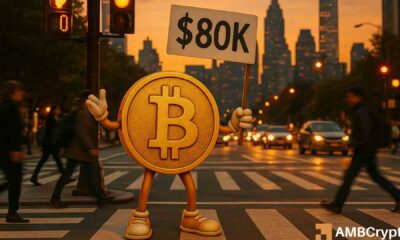Social
Will The Sandbox [SAND] investors mend their ways after this market crash
![Will The Sandbox [SAND] investors mend their ways after this market crash](https://ambcrypto.com/wp-content/uploads/2022/05/mehdi-messrro-szLT9wyt1J8-unsplash-2-1000x600.jpg)
12 May saw massacres across the crypto market, compounded by Terra [LUNA] and TerraUSD [UST] crashing to unimaginable lows. However, 13 May had Bitcoin and Ether seeing recoveries of more than 5% in a day. This boosted the alts as well. All in all, the drama considerably changed the way investors feel about their favorite assets.
However, have recent circumstances convinced metaverse token investors to rethink the way they’re treating a certain project? Let’s see what the metrics say.
There’s more to me. . .right?
The Sandbox [SAND] should have been famous for its potential as a blockchain-based world building platform. Instead, it’s largely seen as the kind of asset investors buy low so they can sell high and exit. Even so, at press time, SAND was the 40th biggest crypto by market cap. The token was trading at $1.36 after rallying by 17.52% in the past day and falling by 34.16% in the past week.
So are investors ready to commit to SAND, or is it slipping through their fingers? You see, SAND supply on exchanges sharply spiked by tens of millions of tokens to reach levels seen in late February, which means the latter is more likely.

Source: Santiment
However, one important incident that came to pass was a huge spike in SAND’s Age Consumed metric on 5 May. This tells us that a large number of idle tokens moved even as SAND’s price was going down. This metric was again increasing slightly at press time, hinting that investors are paying more attention to the asset.
Source: Santiment
Meanwhile, when studying whale transactions above $100,000, we can see these began to rise as SAND’s price fell. Shortly afterwards, recovery began taking place. While it’s possible that whales were buying the dip, exchange supply data suggests profit-taking might be happening yet again.
Source: Santiment
A bird in SAND is worth two in the bush?
Though a green candle was forming at press time, that isn’t a sign for the bulls to jump in. The Awesome Oscillator [AO] showed red bars growing in height below the zero line – a sign of rising bearish pressure.
Adding to that, the Relative Strength Index [RSI] showed that SAND had been an oversold asset just shortly before press time.

